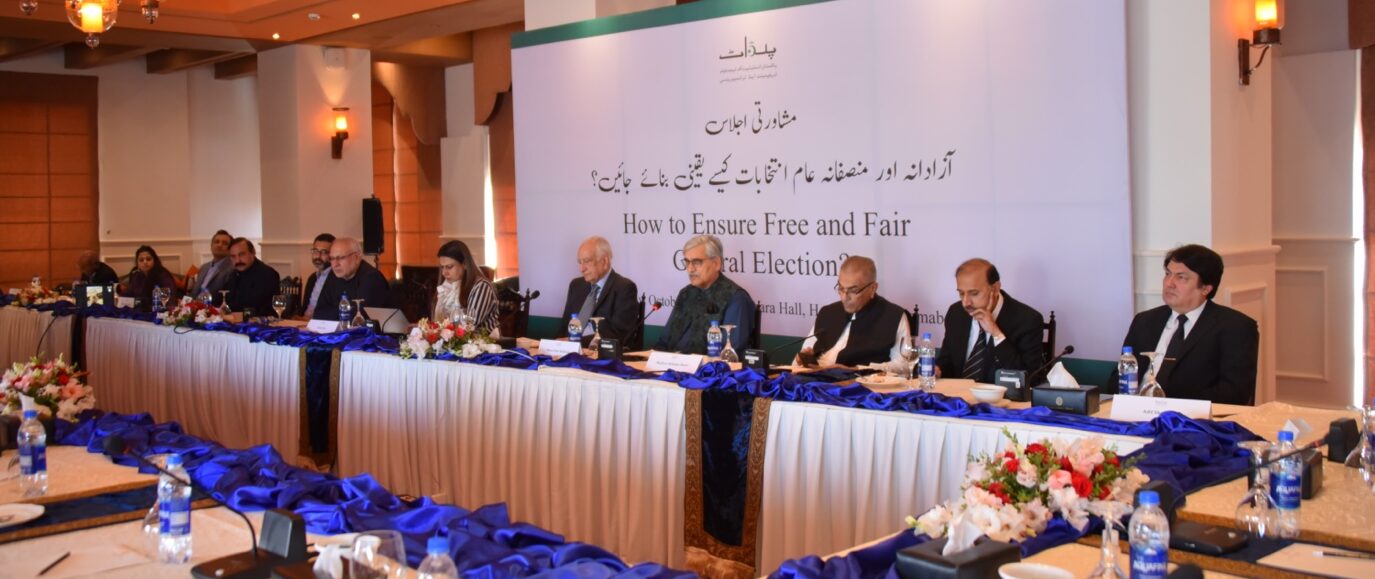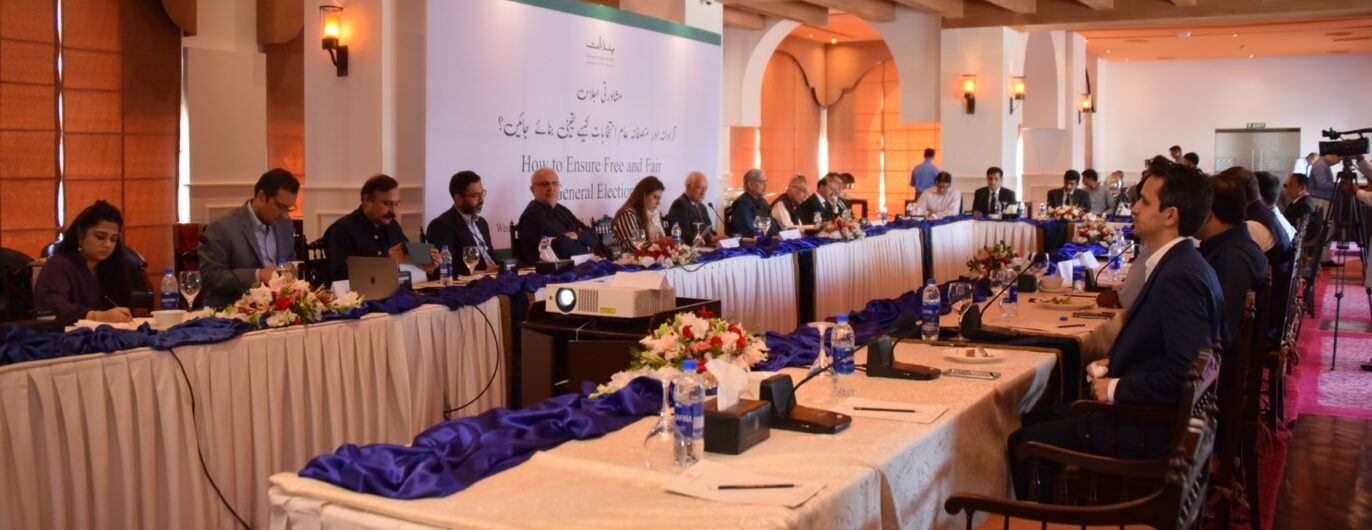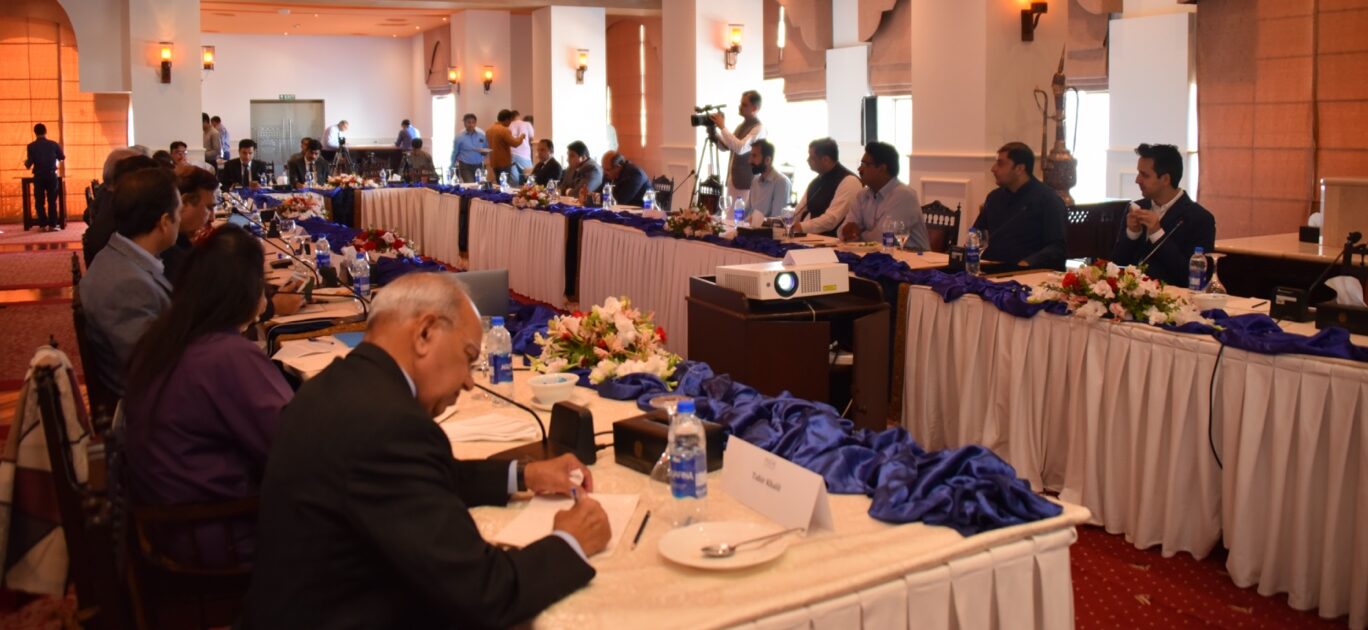
October 11; The Pakistan Institute of Legislative Development and Transparency-PILDAT conducted a thought-provoking consultative session in Islamabad aimed at addressing the crucial topic of ‘How to Ensure Free and Fair General Elections’. The discourse brought together a diverse group of experts and key stakeholders, including legal scholars, politicians, civil society members, media and academia to discuss the challenges and potential solutions in the realm of democratic elections in Pakistan.
The dialogue began with a focus on the fundamental principles enshrined in the Constitution of Pakistan, reflecting the significance of representative democracy, by Mr. Shahid Hamid, Former Governor and Federal Minister. The extracts from various constitutional articles, including Article 2A, Article 48, Article 50, Article 51, Article 58, Article 106, Article 112, Article 218, Article 224, and Article 254, were highlighted to emphasize the state’s commitment to democratic governance and the mechanisms for conducting free and fair elections. Mr. Shahid Hamid emphasized the importance of chosen representatives of the people, highlighting the role of the President, the National Assembly, the Senate and Provincial Assemblies in the democratic process. The Constitution’s provisions on the dissolution of legislative bodies and the appointment of caretaker cabinets were discussed to underscore the legal framework for conducting elections.
Former Senator Farhatullah Babar, representing the Pakistan Peoples Party (PPP) delved into the need for an independent investigation into the incidents of May 09, the failures of the Result Transmission System (RTS), and the ongoing necessity for electoral reforms. He called for exploring the implementation of compulsory voting and introducing a ‘None of the Above’ (NOTA) option to enhance the democratic process. The participation of minorities and the role of social media in manipulating election results, especially by state institutions, were identified as critical concerns. Mr. Babar said that the prospect of holding the 12th General Election by the last week of January 2024 appears to be probable and not certain. He underscored that this forum must ask for a firm date of the 12th General Election from the ECP. He also underscored that the role of the military establishment in the political and electoral sphere must end. He also questioned the role of caretaker governments and said that a majority of countries do not have a caretaker system and Pakistan’s Parliament must also re-consider its use. Role of the higher judiciary in electoral process must be curtailed. He added that since NADRA data is security-driven and CNICs are based on citizens’ requests, there should be a serious conversation on de-linking the Voting list from the NADRA database.
Mr. Ishaq Khan Khaqkwani, representing the Istehkam-e-Pakistan Party, shared his extensive experience in Pakistani elections, highlighting the potential for political engineering, particularly in the formation of governments and the intricate vote-counting methodologies. He expressed concerns about the vulnerability of election officials to manipulation and stressed the importance of proper training and diversity in their recruitment.
Mr. Rasheed Chaudhry, from the Free and Fair Election Network (FAFEN), provided valuable insights on the lessons learned from delimitation, emphasizing the need for an independent Delimitation Commission. He pointed out the importance of separating the Election Commission of Pakistan’s (ECP) powers from judicial authority. Mr. Chaudhry also raised concerns about the lack of right to appeal in delimitation matters and ECP’s deviation from the parliament-defined criteria for demarcating districts. Mr. Chaudhry further highlighted the urgency of electoral reforms, including the allocation of reserved seats for women, suggesting the exploration of a divisional quota to ensure a more representative system. He emphasized the pressing issue of a level playing field in elections, both in terms of political dynamics and the impact of money in politics. Chaudhry stressed the need for close monitoring of election expenditures by the ECP.
Hafiz Tahir Khalil, a respected voice in the mainstream media of Pakistan, expressed a compelling message. He emphasized that Parliament seems to be surrendering its powers and hence, urged politicians to unite in forming a national agenda to address Pakistan’s most pressing concerns. Khalil underscored the pivotal role that PILDAT can play in balancing the political landscape and providing much-needed inspiration and hope for the youth of the nation.
Mr. Shoaib Shaheen of the Pakistan Tehreek-e-Insaf (PTI) addressed critical issues surrounding missing persons and political workers of PTI. He highlighted the case of Mr. Usman Dar and lamented the growing erosion of respect for state institutions. Mr. Shaheen pointed out that trust and faith in the system are diminishing, exacerbated by heightened political polarization, which he noted has led to increased violence. He stressed the urgency of recognizing these growing concerns before they lead to societal disintegration. Mr. Shaheen also emphasized the importance of granting the right to vote to overseas Pakistanis, highlighting its significance for the upcoming election. He called for a thorough investigation into the events of May 9 and the curtailment of democracy, suggesting the formation of a judicial commission.
Professor Zafar Nawaz Jaspal, an esteemed academician, proposed the development of a consensus on the code of conduct for political parties. He emphasized the significance of aligning the role of the ECP before, during and after elections with the law. Additionally, he stressed that contestants must demand genuinely free and fair elections.
Dr. Taha Ali, a specialist in election technology, addressed the alarming deterioration of the election system in Pakistan. He expressed concerns about the lack of suitable forums and the absence of the necessary capability and capacity among relevant individuals to propose and implement essential reforms. Dr. Ali called for a more concerted effort to address these issues and warned that stakeholders may not fully comprehend the gravity of the situation. He expressed doubt about the forthcoming election, questioning its fairness and stressing that Pakistan lags behind in its quest for electoral democracy.
Dr. Tariq Fazal Chaudhry, a former Federal Minister of the Pakistan Muslim League-Nawaz (PML-N), emphasized that the election should not be further delayed. He commended the parliament’s electoral reforms committee for producing commendable recommendations but urged the continued progress of the process. Dr. Chaudhry pointed to lingering issues such as election expenses and called for concerned individuals to take up their roles and responsibilities. He underscored the critical importance of political parties coming together on a forum to communicate and harmonize their efforts, identifying this as the most vital factor in ensuring free and fair elections.
Mr. Bilal Gilani, Executive Director of Gallup Pakistan, painted a sobering picture of the upcoming election, stating, ‘Probably the most uncertain and disappointing election has never been faced by Pakistan.’ He highlighted the reservations held by the majority of the population about the election’s fairness. The largest political party in Pakistan, PTI, finds itself with an overwhelming majority that has lost faith in the ongoing electoral process. Mr. Gilani noted that while the election is a significant issue, inflation has now taken center stage, impacting 50% of the population who believe that democracy is falling short of delivering and he cautioned against holding just one or two stakeholders responsible for this predicament.
Professor Qamar Cheema, an Assistant Professor in the International Relations Department at the National University of Modern Languages (NUML), voiced his concern over the priorities of the political class. He observed a tendency to prioritize dialogue with the establishment over engagement with political and elected stakeholders and bodies. Professor Cheema noted a lack of concern from the international community about free and fair democratic elections, as it seems to have taken sides with powerful individuals.
Mr. Muhammad Ali Durrani, former Federal Minister, highlighted a critical concern: the belief that democracy belongs to the electables, not the people. Local government elections, according to Mr. Durrani, are blatantly ignored, depriving the common man of any opportunity to participate in the electoral process. He called for simultaneous elections at the federal, provincial and local government levels to address this issue effectively.
Rana Kaiser Ishaque, Assistant Resident Representative UNDP Pakistan, stressed that elections should not only be free and fair but also inclusive. He emphasized that the proper implementation of existing laws can make this happen, particularly by ensuring access to polling stations for all, including minorities.
Senior Journalist and Analyst, Mr. Mujib-ur-Rehman Shami, added a significant dimension to the discourse. He underscored a core issue plaguing Pakistan’s political landscape – the reluctance of political parties to accept defeat gracefully. Mr. Shami emphasized that the culture of acknowledging electoral outcomes needs to become a norm in Pakistani politics, and the constant challenge to the legitimacy of election results must be addressed. He also highlighted the issue of institutional interference as a significant obstacle to a smooth electoral process. Mr. Shami stressed the importance of conducting elections as scheduled, asserting that this is crucial for Pakistan’s democratic stability.
In his introductory remarks, Mr. Ahmed Bilal Mehboob, President PILDAT, said that the nature and conduct of General Election in Pakistan has been suspect in the past. He narrated a history of manipulation of Pakistan’s earlier General Elections.
PILDAT remains committed to fostering discussions and facilitating informed dialogue on the crucial issue of free and fair elections in Pakistan. The event concluded with a commitment to continue advocating for electoral transparency and the protection of democratic values in the country.
Participants who joined the consultative session include the following (written in alphabetical order by last name):
Dr. Taha Ali, Assistant Professor, Department of Electrical Engineering, National University of Science and Technology (NUST); Mr. Farhatullah Babar, Former Senator/Secretary General-Pakistan Peoples Party Parliamentarians (PPPP), Dr. Tariq Fazal Chaudhry, Former Minister, Pakistan Muslim League-Nawaz (PML-N), Mr. Rasheed Chaudhry, Deputy Director Programs, Free and Fair Election Network (FAFEN), Dr. Qamar Cheema, Assistant Professor, Department of International Relations, National University of Modern Languages (NUML), Mr. Muhammad Ali Durrani, Former Minister for Information and Broadcasting, Mr. Bilal Gilani, Executive Director, Gallup Pakistan, Mr. Shahid Hamid, Former Governor Punjab/Senior Supreme Court Advocate, Mr. Rana Kaiser Ishaque, Assistant Resident Representative, United Nations Development Programme (UNDP) Pakistan, Dr. Zafar Nawaz Jaspal, Director, School of Politics and International Relations (IR), QAU, Mr. Tahir Khalil, Bureau Chief-Islamabad, JANG, Dr. Alamzeb Khan, HOD, School of Law, QAU, Mr. Ishaq Khan Khaqwani, Senior Leader, Istehkam-e-Pakistan Party (IPP), Barrister Muhammad Ali Saif, Former Senator/Secretary Information Khyber Pakhtunkhwa-PTI, Mr. Shoaib Shaheen, Senior Advocate Supreme Court of Pakistan/Member Core Committee PTI/Member Legal Committee-Pakistan Tehreek e Insaf (PTI), Mr. Mujib ur Rehman Shami, Editor-in-Chief Daily, Pakistan, Mr. Aamir Wasim, Bureau Chief-Islamabad, DAWN.









